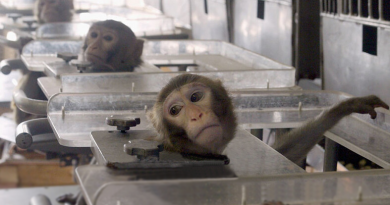Moving away from animal derived anti-bodies
The European Union Reference Laboratory for alternatives to animal testing (EURL ECVAM) recommends that animals should no longer be used for the development and production of anitbodies for research, regulatory, diagnositic and therapeutic applications.
From: http://act.navs.org/site/MessageViewer?em_id=6145.0&dlv_id=15411
Antibodies are important tools in science because they are capable of binding to their unique biological targets with a high level of specificity. As a result, scientists use them in many ways: for research, diagnostics, therapeutics and regulatory procedures.
Although non-animal methods for developing and producing antibodies exist, animals are still widely used for this purpose—and these procedures often cause severe animal suffering. It is estimated that a million animals are used every year for antibody development and production in the European Union alone.
In addition to the ethical issues surrounding the use of animals for this purpose, scientific concerns about animal-derived antibodies have been raised for decades. These concerns center around limitations with both the antibodies’ specificity and reproducibility. Antibodies derived from animals often suffer from batch-to-batch variability, and many show low specificity for their targets.
In a report issued earlier this month, the European Union Reference Laboratory for alternatives to animal testing (EURL ECVAM) recently addressed this issue. Their Scientific Advisory Committee concluded that “non-animal-derived antibodies are mature reagents generated by a proven technology that are not only equivalent to animal-derived antibodies, but in many respects can offer significant scientific advantages and economic benefits.”
As a result, the committee issued the following recommendation:
“EURL ECVAM recommends that animals should no longer be used for the development and production of antibodies for research, regulatory, diagnostic and therapeutic applications. The provisions of Directive 2010/63/EU should be respected and EU countries should no longer authorise the development and production of antibodies through animal immunisation, where robust, legitimate scientific justification is lacking.”
Maurice Whelan, head of EURL ECVAM, noted, “The EU Directive 2010/63 on the protection of animals used for scientific purposes is very clear. When a scientifically valid alternative is available, then it simply must be used.”
The EURL ECVAM report lays out a very strong case for the use of non-animal-derived antibodies. It addresses misconceptions about non-animal-derived antibodies and provides suggestions on ways the EU can promote their generation and use. The report also provides guidance for antibody manufacturers/suppliers and end-users, as well as editors, reviewers and publishers of scientific publications on how to make the transition to non-animal-derived antibodies.
This is an encouraging move that we hope will resonate with the EU’s counterparts here in the United States. The National Toxicology Program (NTP) Interagency Center for the Evaluation of Alternative Toxicological Methods (NICEATM), which met late last year on the use of non-animal-derived antibodies, plans to reconvene after reviewing the EURL ECVAM report.
The potential to drastically reduce animal use in this area is very high—the EU has now shown that it is possible—and we will continue to keep you posted on ongoing developments in this area.
Sources:
Gray, A.C, et al. “Reproducibility: bypass animals for antibody production,” Nature, May 15, 2020.
European Commission Website, “Better antibodies without using animals,” May 15, 2020.
European Commission Report, “EURL ECVAM Recommendation on Non-Animal-Derived Antibodies,” May 2020.




